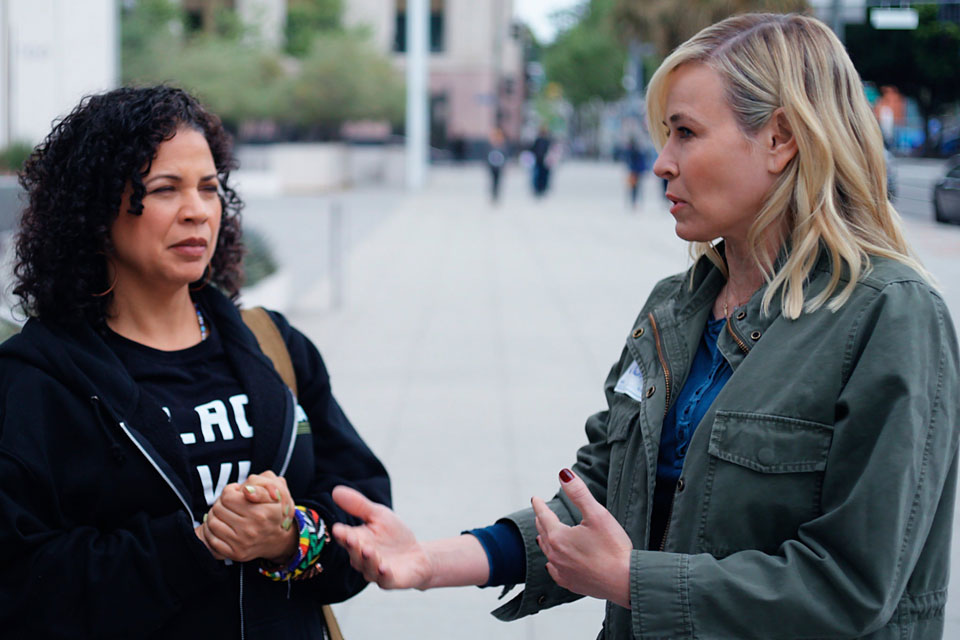It was hard to start the documentary, Hello Privilege. It’s Me Chelsea, with the confidence that Chelsea Handler, comedian, actress, and award-winning writer (who has a book cover which features her in Ugandan traditional dress beneath the title ‘Ugandan Be Kidding Me’) was going to grapple with the complex nuances of White privilege in a serious and committed manner.
Unsurprisingly, my cynicism was not misplaced. If one is to be generous and believe this documentary really was a selfless attempt to gain an understanding of her own social status and agency, rather than an effort to counteract 44 years of accumulated guilt, one could label this a failed attempt at the very least. Whilst my disappointment is directed at Handler and the lazy and self-indulgent style she conducted herself with throughout her 1hr 4 min special, I find it far more unforgivable and telling that Netflix, the billion dollar mogul, would accept such a poor standard of investigative work from the project they have funded.
If one can look past the bizarre concept of a White woman taking centre stage to educate herself and Netflix viewers on a privilege that has essentially propped up her whole career, sadly there is little relief in the wake of the litany of missed and wasted opportunities expended throughout. Handler’s careless and sarcastic interviewing style does not achieve the cool, down-with-the-kids demeanour she so clearly strives for.
Instead it holds a detached indifference, ironically symptomatic of the very privilege she is challenging. Her first interview with Kevin Hart and Tiffany Haddish sets this precedence. Voicing their grievances, both comedians speak of the disadvantages of being Black in an entertainment industry built upon nepotism and racial scepticism. Whilst Handler clearly does her best to retain an air of earnestness, either boredom or a short attention span results in her interjection of a completely unnecessary ill-humoured sexual innuendo – a tangent from an unaired anecdote about a past experience of Haddish’s. In derailing any possibility for adult conversation, Handler plays out the lived experience of Black people everywhere.
Although one can credit Netflix for airing a critique of the entire production at the first stop on Handler’s self-serving campaign, what they thought to be democratic transparency on their part was in fact far more controversial. A Black audience member of the spoken word event Handler was attending deemed the film ‘another example of White privilege’, with specific address to the plausibility of Handler entering these spaces to ‘learn’ without the act of ‘taking’. The inclusion of this criticism revealed a far darker truth of White privilege, one which neither Netflix nor Handler had the sensitivity to be conscious of – the omission of the Black voice altogether. Had the Black woman’s rationale been engaged with the sincerity it deserved, the concept of the show would have been taken back to the drawing board, perhaps even with a Black figurehead. But sadly, a momentary expression of recognition gave way to a response of nothingness, continuing with a full steam ahead approach.
Whilst a significant part of the documentary is rightly reserved for Handler’s education from the Black community, in a painfully pathetic attempt to ‘get on side’ and see up close the ignorance facing the Black community, she aptly scouted out Georgia’s Oktoberfest as a venue for a demographic struggling with the concept of White privilege. Picking on punters at the event she then ensued in a series of blatantly leading questions, the crudest being “So, what we’re filming is a documentary on White privilege, to see if it exists or a fantasy that people are just making up in their heads. What do you think” She successfully ensnares “I think it’s something they’re making up in their heads”, substantiating to the viewer the clear distinction between the racist whites and herself.
Though the whole documentary is undeniably crass it was her reunion with teenage boyfriend that felt most unsavoury. It seemed as though the whole episode was geared toward her confessional admission that she had a Black boyfriend, the strangeness of which was not eased by her painstaking insistence on hanging on to the two syllables of his name “Taaaay-Jauun” – a cringe inducing two minutes I will never get back. It is such a tired and meaningless declaration for those accused of exhibiting racist or White privilege behaviours to drawl the ‘but I have Black friends’ line, but it seems Handler cannot help herself.
Sitting on the pavement outside Tayjaun’s house and listening to the tribulations of his time spent in jail, some of which was spent watching Handler on television, is deeply saddening. However, what is made worse is that by her own acknowledgement the time she spent with his family, though she loved and cared for them was ‘not a good time’ in her life and ‘she was a wreck and off the rails’. The climax of this scene is her entry into Tayjaun’s mother’s house, where she calls out ‘I’m home’ to the upbeat background music – a crude allusion to the white saviour complex. This documentary is not an investigation of White privilege, rather a performance with Chelsea Handler basking in the limelight.
Image Credit: Netflix

